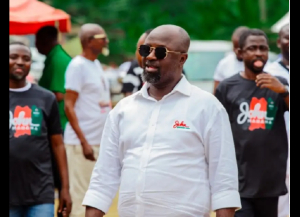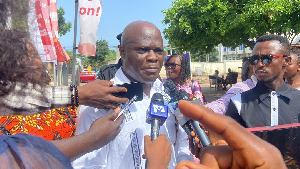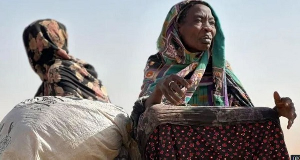GIABA, and Why Ghana must support ratification of 2005 protocol
establishing CIIB in W/A
*The GIABA Meeting should remind Ghana to support ratification of 2005
protocol establishing Criminal Investigative Intelligence Bureau for W/A*
'The Accidental Ecowas & AU Citizen':
By E.K.Bensah Jr
In February 2013, I wrote a piece entitled '*Where is the ECOWAS Sahel
Strategy to Secure & Protect West Africa from Criminals*? In October 2012,
I penned an article entitled '*Mission: ECOWAS has a responsibility to
protect West Africa from Criminals*.' It summarized and reprised arguments
from previous articles I had written about ECOWAS and its responsibility to
secure the sub-region.
Back in October 2011, I wrote yet-again another, entitled '*Time for ECOWAS
to Ratify the Criminal Investigative Intelligence Bureau*'. The idea behind
the piece was to argue that free movement is great for the ECOWAS
sub-region, but comes at a cost - cross-border crime. The provision of free
movement is possible thanks to the Protocol on Free Movement, Right of
Residence and Establishment which was adopted in 1979. In 1980, ECOWAS
members would ratify the first phase of the Protocol guaranteeing free
entry of citizens from member states without visa for ninety days.
I also touched on how West African leaders, working through ECOWAS, had
made significant strides on combating drug trafficking, crime; and what I
described as '*all the attendant vices associated with un-policed porous
borders*'
*ECOWAS structures for securing peace GIABA included!*
At the sub-regional level, ECOWAS has a number of structures that are
helping rein in what might otherwise be a chaotic sub-region. These include
the ECOWAS Regional Action Plan on illicit drugs trafficking, organized
crime and drug abuse; ECOWAS Committees of Chiefs of Security Services, and
Chiefs of Defence Staff; WAPCCO; and GIABA.
Backed by the Canada-based 'The Pearson Peacekeeping Centre', the ECOWAS
Committee of Chiefs of Security Services has assisted ECOWAS since May 2009
to create a committee that ensures proper communication and coordination
efforts with member states on the police component of the African Standby
Force and other regional security issues. The committee is now funded by
the ECOWAS Commission's regular annual budget and meets twice a year.
The ECOWAS Committee of Chiefs of Defence Staffan exclusively military
componentreviews security in the sub-region through quarterly meetings. The
most recent meeting was some two weeks ago when they met to discuss the
character of the African-led International Force in Mai (AFISMA).
The ECOWAS agency that is the Intergovernmental Action Group against
Money-Laundering, or GIABA, is responsible for the prevention and control
of Money Laundering and Terrorist Financing in the West African Sub-Region.
Critical to its mandate is the '*improvement of measures and intensifying
efforts to combat the laundering of proceeds of crime in West Africa*'.
Incidentally, GIABA happens to be one of the ECOWAS agencies associated
with Kofi Annan's newly-established West Africa Commission on the Impact of
Drugs on Governance, Security and Development (WACD).
ECOWAS's formulation of a regional response through their Political
Declaration of 2005 (that put forward the idea of establishing a criminal
investigative intelligence bureau) has helped nip the problem in the bud.
However, considering the fact that that the Criminal Investigative
Intelligence Bureau (CIIB) had been proposed as far back as 2002 by Ghana
for a meeting of the INTERPOL-backed West Africa Police Chiefs Committee
(WAPCCO) in Abidjan, the challenge would have been better dealt with had
member states resolved to establish the-said CIIB.
While ECOWAS community citizens continue to enjoy free movement in the
sub-region, this is a region that has played host to internecine conflicts
especially in the Mano River Union, such as the Liberian conflict of 1990
that prompted the intervention of ECOMOG. I wrote back in October 2011, '*add
to that the porous border, the free movement of mercenaries, coupled with
small arms trafficking and the recruitment of child soldiers and fighters
to the cross-border crimes and we have ourselves a potential powder-keg
that needs significant monitoring through significant systems of
intelligence - as proposed by the yet-to-be-ratified CIIB*'.
Although the intensity of the Mali conflict has died down - at least away
from the glare of the media - there is no gainsaying that 2013 continues to
be a year in which ECOWAS has not completed its work in Northern Mali;
neither done with piracy nor the Sahel crisis. These are new elements
forcing ECOWAS to take the bull by the horns on factoring not just the
visceral peace and security instruments it is so used to, but a
law-enforcement perspective that is sufficiently holistic to secure and
protect West Africans from criminals and miscreants.
*Way Forward for ECOWAS*
At a time when African integration observers are talking of both the
Continental Free Trade Area (CFTA) and a putative Arab Maghreb Union
(AMU)-ECOWAS-CENSAD free trade area (along the lines of the tripartite
COMESA-EAC-SADC free-trade area), this second FTA is unlikely to go
anywhere quickly without ECOWAS getting very serious on distinguishing
between what I would call 'hard'(war; drug-trafficking; human-trafficking)
and 'soft'(cross-border and petty crime) conflict.
It is very encouraging to read of Joint Border Patrols in the sub-regionas
prescribed by the INTERPOL-backed West African Police Chiefs Committee. A
recent conference by the Mano River Union countries only two weeks ago that
was held in Liberia re-visited the idea of Joint Border Patrols as a way of
securing their borders. Coming from a micro-region that served as a
catalyst for ECOWAS' first-ever intervention in West Africa under ECOMOG,
this can only be good news that West Africa is capable of managing its own
affairs.
I continue to press that ECOWAS might not have had the foresight of
establishing a West African law enforcement mechanism (like the EU did with
EUROPOL with respect to the Treaty of Maastricht in 1992) the very moment
the Treaty of Lagos was revised in 1993 to reflect the current challenges
of ECOWAS, but it can never be too late, I wrote in October 2011, '*to
rectify the imperative of a sub-regional police force along the likes of
INTERPOL or EUROPOL*'. ECOWAS's imperative and comparative strengths on
peace, security, and conflict prevention ought to give it the necessary
impetus to bring to fruition the belated '*ECOWASPOL*'/CIIB the sub-region
so desperately needs to secure the region for its citizens.
*In 2009, in his capacity as a 'Do More Talk Less Ambassador' of the 42nd
Generationan NGO that promotes and discusses Pan-Africanism--Emmanuel gave
a series of lectures on the role of ECOWAS and the AU in facilitating a
Pan-African identity. Emmanuel owns "Critiquing
Regionalism
(http://critiquing-regionalism.org). Established in 2004 as an initiative
to respond to the dearth of knowledge on global regional integration
initiatives worldwide, this non-profit blog features regional integration
initiatives on MERCOSUR/EU/Africa/Asia and many others. You can reach him
on ekbensah@ekbensah.net / Mobile: +233-268.687.653*.
Opinions of Friday, 17 May 2013
Columnist: Bensah Jr., Emmanuel K.














